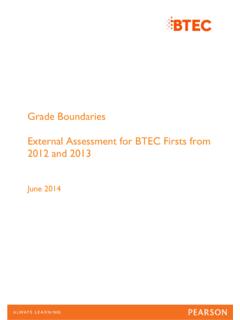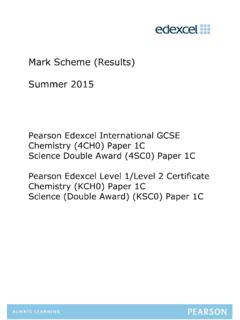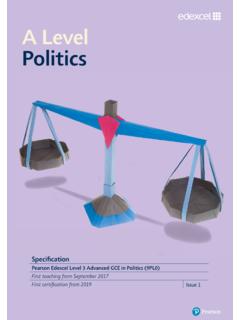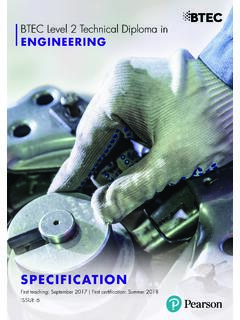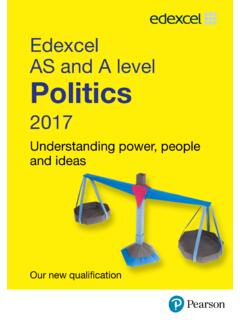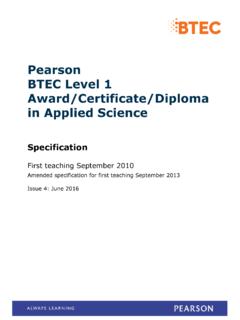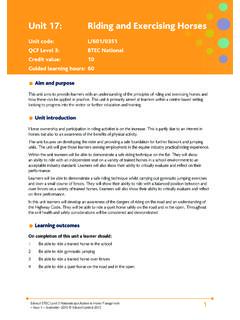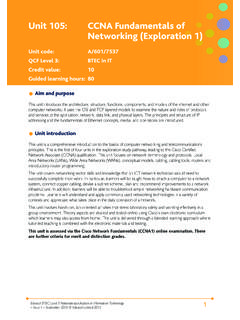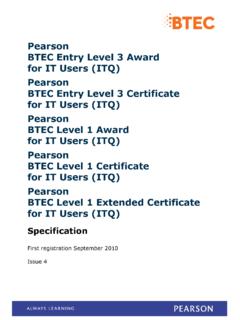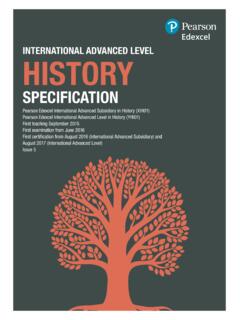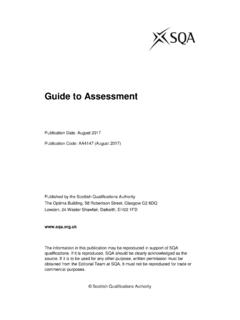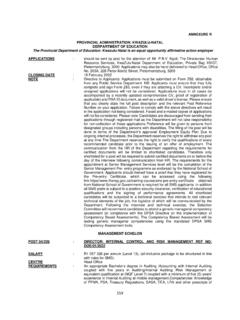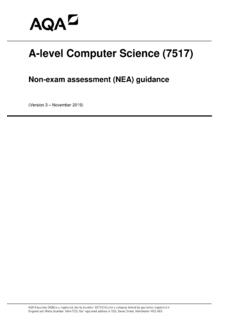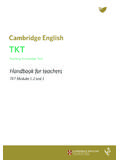Transcription of A guide for Functional Skills Access Arrangements
1 1 | P a g e guide for Functional Skills Access Arrangements 2021 - 2022 Level 1 and Level 2 Functional Skills qualifications Exceptional employer or remote invigilation Where students are being invigilated by employers or using our remote invigilation service these Access Arrangements may not be practical. The centre should contact with the details in either case. Where permitted by the specification, the following Arrangements may be granted by the centre and do not need to be recorded. Evidence of need is not required to be held on file. Amplification equipment Bilingual dictionary Braille transcript Braillers Closed Circuit Television (CCTV) Colour naming by the invigilator for candidates who are colour blind Coloured overlays Examination on coloured/enlarged paper Live speaker for pre-recorded examination components Low vision aid/magnifier Optical Character Reader (OCR) scanners Prompter Read aloud Separate invigilation within the centre Sign Language Interpreter Supervised rest breaks Word processor Where permitted by the specification, the following Arrangements may be granted by the centre without prior approval from Pearson.
2 These Arrangements must be recorded on a Centre Delegated Access Arrangements Form (with appropriate evidence of need). The names and numbers of candidates who were granted these Arrangements must be listed. Bilingual dictionary with 10% extra time (solely for the use of the dictionary) 25% extra time For all other Access Arrangements , as detailed below, centres must apply at least 6 weeks before the examination via Pearson Access Arrangements Online. For QMA Functional Skills , centres must submit an Application for Access Arrangements by completing the form Application for Access Arrangements Learning Difficulties or Application for Access Arrangements Medical to be emailed to the Special Requirements Team at 2 | P a g e Exemptions Extra time over 25% Practical Assistant Scribe/speech recognition technology 3 | P a g e Other adjustments Where a candidate whose disability has a substantial and long-term adverse effect on him/her, other adjustments, which are not listed, may be required.
3 The centre should, in the first instance, contact Pearson at the earliest opportunity to discuss the candidate s particular needs. To be eligible for the following Access Arrangements please see below the requirements required. Computer reader/Human reader - Covering letter is required from the SENCo explaining the candidate s need & normal way of working. Exemptions - must not undermine the integrity of the qualification; only be granted as a last resort when no other Access arrangement is available; apply only to whole components where the candidate cannot demonstrate any of the Skills ; An exemption will not be granted if an alternative and accessible route through a qualification is available to the candidate . Extra time over 25% - Results must be given as standardised scores. So as not to give an unfair advantage, only very substantially below average standardised scores of 69 or less are acceptable.
4 The candidate must have two very substantially below average standardised scores which relate to two different areas of speed of working as below. A candidate who has a physical, a sensory or multi-sensory impairment that very substantially hinders his/her speed of working Practical Assistant in practical assessments - Detailed information must be provided listing the tasks which the practical assistant would perform. This will allow Pearson Edexcel to ensure that the assessment objectives are not compromised. Practical Assistant in written papers - Detailed information must be provided listing the tasks which the practical assistant would perform. This will allow Pearson Edexcel to ensure that the assessment objectives are not compromised. Where approved, the practical assistant will carry out practical tasks at the instruction of the candidate . Scribe/speech recognition technology - For examination purposes, a substantial impairment is interpreted as the candidate having: a spelling accuracy score in the below average range (a standardised score of 84 or less) where target words are unrecognisable and the writing is incomprehensible; confirm that the candidate has persistent and significant writing difficulties and is disabled within the meaning of the Equality Act 2010; include evidence of the candidate s current difficulties and how they substantially impact on teaching and learning in the classroom; show the involvement of teaching staff in determining the need for a scribe; Other adjustments - Where a candidate whose disability has a substantial and long-term adverse effect on him/her, other adjustments, which are not listed, may be required.
5 The centre should, in the first instance, contact Pearson at the earliest opportunity to discuss the candidate s particular needs. The candidate will have been assessed with appropriate up to date tests being conducted within 26 months of the final examination 4 | P a g e Entry Level Functional Skills qualifications Where permitted by the specification, the following Arrangements may be granted by the centre and do not need to be recorded. Evidence of need is not required to be held on file. Amplification equipment, taped questions and responses Bilingual dictionary Braille transcripts Braillers Brailling of non-secure assessment material Closed Circuit Television (CCTV) Colour naming by invigilator for candidates who are colour blind Coloured overlays Communication Professional, for candidates using Sign Language, for written questions and responses Enlarge or photocopy the question paper on to coloured paper Live speaker for pre-recorded examination components Low vision aid/magnifier Optical Character Reader (OCR) scanners Prompter Read aloud Separate invigilation within the centre Supervised rest breaks Word processor Please revert to requirements for L1 & L2 Access Arrangements Where permitted by the specification, the following Arrangements may be granted by the centre without prior approval from Pearson.
6 These Arrangements must be recorded on a Centre Delegated Arrangements Form. The names and numbers of candidates who were granted these Arrangements must be listed. Bilingual dictionary with 10% extra time (for the use of the dictionary) Computer reader/Reader Extra time in timed components Practical assistant Scribe 5 | P a g e Subject Specific additional information for Functional Skills qualifications The information published applies to all levels of Functional Skills English, ICT and Mathematics qualifications. English Reading Access Arrangements Yes/No Notes Extra time Yes Dictionaries and bilingual dictionaries Yes The use of a hard copy dictionary or a bilingual dictionary is permitted for all candidates. Online dictionaries are not permitted. Reader No Computer reader Yes Sign Language Interpreter No Scribe Yes Speech recognition technology Yes Word processor Yes Practical Assistant Yes Modified question papers (including Braille) Yes Please email to request this.
7 Models, visual/tactile aids, speaking scales Yes See above External device to load personal settings Yes Permitted as a reasonable adjustment if this does not compromise the assessment or give the candidate any advantage not available to other candidates. Reading within Functional Skills English is defined as the independent decoding and understanding of written language and text in a purposeful context. Text is defined as materials that include the use of words that are written, printed, on-screen or presented using Braille. English Reading assessments: Spelling, punctuation, and grammar (SPAG) are not assessed in Reading assessments. The use of any of the Access Arrangements above therefore has no impact on marks awarded for Reading. A computer reader may be used in the Reading component of Functional Skills English where its use reflects the candidate s normal way of reading. A computer reader is an acceptable arrangement since it still allows the candidate to independently meet the requirements of the reading standards.
8 6 | P a g e A human reader cannot be used to demonstrate the requirements of the reading standards as this does not meet the requirement for independence. As a last resort, an exemption from the Reading component can be requested for a disabled candidate who cannot use assistive technology. 7 | P a g e Speaking, Listening and Communication Sign Language ( , BSL, SSE) is permissible in the Speaking, Listening and Communication component, provided this is made accessible to all participants in the discussion. (It is recognised that BSL is a language in its own right and not a form of English. BSL is, however, permitted as an alternative to English for the assessment of Speaking, Listening and Communication where BSL is the candidate s normal way of communicating in the contexts described by the standards.) No other languages are permitted as alternatives to English. Similarly, Access to augmentative speech equipment is permissible where it reflects the candidate s normal way of working.
9 As a last resort, candidates who are disabled under the terms of the Equality Act 2010 and have no accessible means of communication may request an exemption from the Speaking, Listening and Communication component. Writing Access Arrangement Yes/No Type of assessment Extra time Yes Dictionaries No Bilingual dictionaries No Human reader Yes Computer reader Yes Sign Language Interpreter Yes Scribe No Speech recognition technology Yes Candidates have Access to SPAG marks for the Skills which they have demonstrated. Where applicable, the mark scheme is applied best fit and an adjustment applied to reflect those Skills the candidate has not demonstrated, which may include spelling, punctuation, and grammar. The scribe cover sheet must be used to record which Skills the candidate has demonstrated independently. Word processor Yes Spell and grammar checkers must be disabled. Candidates have full Access to SPAG marks.
10 Practical assistant Yes Modified question papers (Including Braille) Yes Please email to request this. Models, visual/tactile aids, speaking scales Yes See above 8 | P a g e External device to load a personal setting Yes Permitted as a reasonable adjustment provided that this does not compromise the assessment or give the candidate any advantage not available to other candidates. 9 | P a g e In Functional Skills Mathematics and Functional Skills ICT qualifications candidates can have Access to all forms of equipment, software and practical assistance, such as a reader or a scribe that reflect their normal way of working within the centre. However, such adjustments must not affect the reliability or validity of assessment outcomes or give the candidate an assessment advantage over other candidates undertaking the same or similar assessments. Mathematics Access Arrangements Yes/No Type of assessment Extra time Yes Dictionaries and bilingual dictionaries Yes The use of a dictionary or a bilingual dictionary is permitted for all candidates.
